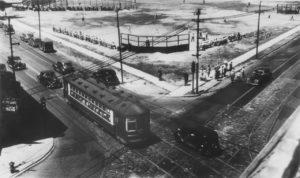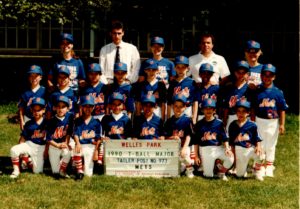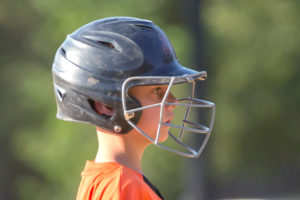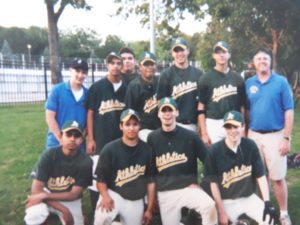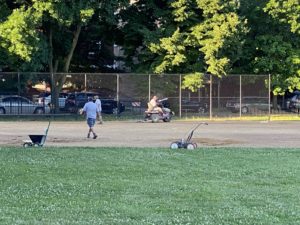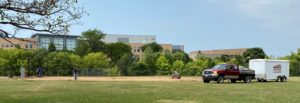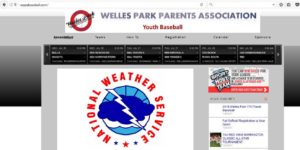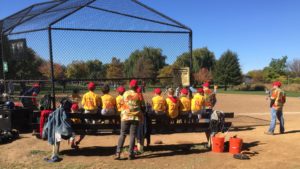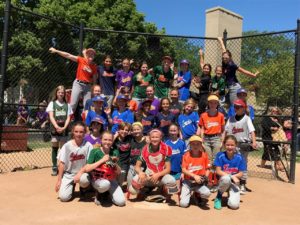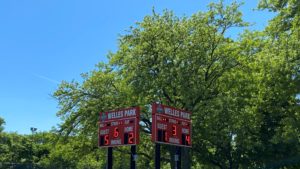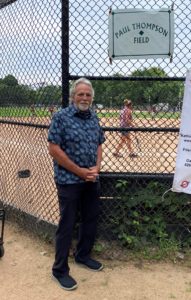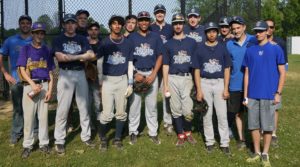The History of WPPA
The Lincoln Park Commission opened Welles Park in 1910, named in honor of Gideon Welles (1802-1878), Secretary of the Navy from 1861 to 1869. Initially eight acres between Western/Montrose/Sunnyside, the park expanded to its current footprint that extends to Lincoln Avenue in 1922.
THE BEGINNING OF WPPA
For many years, the Chicago Park District operated youth baseball leagues at Welles Park. In 1990, then-Park Director George Poulos asked Gene Sims, a volunteer parent involved with the Welles Park youth sports programs, to his office to discuss the future of youth sports at Welles Park. The sports programs, and particularly baseball, were taking up more time than park district staff had available, so parents would have to become more involved in running youth baseball in particular if that program was to continue. In turn, Gene called for a meeting of parents who had children participating in youth baseball at Welles Park, and they gathered inside the Welles Park Field House to explore options. From that meeting, the parents elected 5 initial directors to the Board of Directors and thus was born the Welles Park Parents Association—WPPA—headed by inaugural President Gene Sims (with substantial support from his wife, Sue).
Why "Welles Park Parents Association" and not "Welles Park Baseball Association"? Initially the Park District asked WPPA to help run other youth sports programs at Welles Park as well, which WPPA did in the beginning. But after a few years, WPPA focused exclusively on youth baseball.
WPPA: THE EARLY YEARS
As many of today's participants in WPPA know, the five baseball diamonds at Welles Park are named after their respective divisions of play: Rookie (ages 5 and 6), Junior (ages 7 and 8), Minor (ages 9 and 10), Major (ages 11 and 12) and Senior (ages 13 and 14). But the divisions actually started with different names: Rookie was known as "T-Ball Minor," and Junior was called "T-Ball Major." Then the Minor and Major divisions were known as "PeeWee Minor" and "PeeWee Major," respectively. The Senior division went by "Midgets." The current division names took hold in the mid-1990s.
In its first year, WPPA registered around 350 players. Almost immediately, demand to play increased. The league held two in-person registration dates, with the first being on the last Saturday of January for returning players, and the second being on the first Saturday of February for new players. Parents would start lining up outside the Welles Park Field House during the wee hours of the Saturday morning new player registration began in order to secure a spot for their child in the league. By the time new player registration actually opened, the line circled the building. Eventually WPPA switched to a lottery system—allowing parents to register their new players at their leisure without having to get in line during the darkness of the night, and WPPA continues to utilize a random lottery number assignment system to this day to allocate limited spots available to new players each year.
Other than the Rookie division, WPPA selects players for house teams by allowing coaches to "draft" players. Returning players are ranked and evaluated by their coaches from the prior year, but new players were unknown. In the beginning, shortly after completing registration in February, WPPA held player evaluations (aka "tryouts") for new players who received a spot in the league. Evaluations occurred initially at the Welles Park Fieldhouse and later at the Broadway Armory in February or early March. Eventually, WPPA determined that the time and effort required from both parents, the players and evaluating volunteers to host the tryouts was not markedly better than relying on parental representations of a player's prior baseball experience, and thus the tryout process ended in 2007.
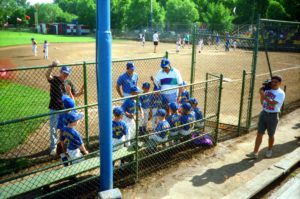
Coach (and later WPPA President) Max Griffin (white shirt) gets his Mariners ready for their Thillens Weekend game in 1992.
One of the few aspects of WPPA that has changed little over the years is the length and structure of the regular spring/summer house season. The season began the last weekend of April. In June, usually on Father's Day Weekend, WPPA held an annual "Thillens Weekend" at what was then known as Thillens Stadium (now called The Stadium at Devon and Kedzie), where games would be played to give the players a "stadium" experience. The season then ran until early July, followed by playoffs and the end-of-season picnic that usually took place the second to last or last Saturday of July.
As one would expect from a new program, WPPA received many parent "suggestions" and other complaints early on. President Sims received so many "inquires" that he had to enforce a rule that parents could not call him after 9pm in the evening to raise and discuss their concerns. To help make that process more efficient, during the regular season, President Sims held weekly "WPPA Parent Court" sessions every Tuesday evening at the Welles Park Major Diamond. Together with the other WPPA board members, they would address complaints and other concerns about all aspects of WPPA baseball from rule interpretations to the equality of play time, and any other issues requiring the attention of the WPPA board. Of course, Parent Court wasn't without flaring tempers, and one group of parents even threatened to start a fistfight on one occasion. But overall Parent Court served its purpose and helped resolve many concerns, issues and disputes, providing useful guidance on appropriate conduct for players, coaches, umpires and parents ever since (including the Parent Code of Conduct and Consent form completed for every registering player each season).
Ever wonder why WPPA players from Junior through Senior are required to wear face cages on their batting helmets? While not frequent, from the very beginning WPPA experienced instances of batters and runners being hit by the ball in their face—whether from an errant pitch while at the plate, an unfortunate ricochet off of a bat or an errant throw to a base. Accordingly, the WPPA board adopted the rule requiring face cages to protect players from black eyes and knocked-out teeth. (In an effort to accommodate older players getting ready for High School baseball, the WPPA board modified this rule in 2020 to allow players in the Senior division to utilize the now-common "C-flap" protector on their helmets instead of face cages).
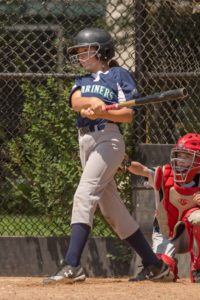
A player on the Major Mariners swinging a Viper wood bat with barrel cupping for balancing and weight reduction.
Another safety concern led to WPPA adopting wood bats for the Major, Senior and Liberty Divisions. Aluminum bats were and still today are manufactured with "trampoline effect" to improve the "exit velocity" -- the speed at which a baseball comes off the bat immediately after the baseball makes contact with the bat. The higher the "bat performance factor" or BPF (e.g., many aluminum or composite bats today are rated 1.15 BPF), the faster the ball will leave the bat, the further it will fly. In addition, "big barrel bats" with diameters of 2-5/8" or 2-3/4" also increased the "sweet spot" on the bat, making it much easier for a batter to make solid contact. Because the skill level of players in WPPA varies, inexperienced and less-skilled players were more susceptible to being injured by a hard grounder or line-drive. In addition, the shorter distance on the Major Diamond to the end of the field house in right field meant more balls hit off the wall or onto the roof. The solution? Wood bats: smaller sweet spot, less trampoline effect.
When the BBCOR standard created by the NCAA for composite bats went into effect January 1, 2011, and high schools also adopted the BBCOR standard, WPPA followed suit and adopted the BBCOR standard as an acceptable alternative to wood bats for the Senior and Liberty divisions. Today, wood bats continue to be the standard in WPPA's Major Division.
WPPA PHASE TWO: THE LEAGUE EXPANDS
Beginning with the 1996 season, Max Griffin became WPPA's second president. With the volunteer parent organization successfully established and consistently delivering quality youth baseball for more than five years, Max along with Vice President Jack Hynes and Registration Chair Jasmine Rasso (who's youngest son still plays with WPPA) took the lead in further growing, developing and professionalizing the league that largely resembles the WPPA baseball experience more than twenty years later.
At the time Max took the helm, then-Alderman Gene Schulter approached WPPA about expanding to include the four diamonds of Winnemac Park: West, Middle, Corner and the larger "Winnemac 4" diamonds. This allowed WPPA to further expand and offer the local community more opportunity to play youth baseball. Initially WPPA utilized the Winnemac diamonds for practices only, but after a couple years WPPA began scheduling regular games at Winnemac as well.
Not long after acquiring the rights to host practices and games at Winnemac, the Chicago Park District approached WPPA with another offer. River Park operated its own baseball league at both River Park and nearby Legion Park, but decided that it, too, would no longer be able to manage the league itself. River Park's offer to WPPA was simple: if WPPA would agree to absorb the players of the River Park baseball league, WPPA would in turn receive the ongoing right to utilize the four baseball diamonds at both River Park and Legion Park for WPPA practices and games. Always willing to accommodate more players and their families, WPPA agreed and added those two parks, four diamonds and a few hundred players to its ranks.
Finally, it bears noting that, as one of his final official acts to help develop WPPA, President Griffin took it upon himself to add 501(c) tax-exempt status on top of WPPA's existing not-for-profit status -- preparing and filing all necessary paperwork himself.
WPPA LIBERTY BASEBALL
In the beginning, WPPA only offered baseball to youth up to the age of 15, with the oldest players registered in the "Midget" division, now known as "Senior." At that time, travel baseball was not common and high school summer leagues were few and far between. In 1997, a group of players aging out of the Midget division wanted to find a way to continue playing baseball together as they had through Welles Park for their entire youth career. In response, long-time WPPA coach David Locks (father of Josh Locks, mentioned under Umpiring), with the help of Les Wise (who served as the original Liberty Division Groundskeeper) and Bill Sullivan, founded WPPA's "Liberty League," now known as the Liberty Division. David served as the original Liberty Commissioner on WPPA's Board and secured the 90-foot baseball diamond at Northeastern Illinois University for games.
Though WPPA's board had concerns about mixing 15-18 year old players together in one, single division (until then, all WPPA divisions only covered players born within a two-year window) because of their broader age differences and the ability to adequately and successfully coach older teenagers, the Liberty Division concerns proved unfounded and players from age 15 through 18 (and even older) consistently play together well without major issue.
The Liberty Division launched its first season in 1998, and after a successful two-year stint at NEIU, moved to Winnemac Park and remained there for several years. The second Liberty Commissioner, Bill Sullivan, eventually moved the Liberty Division to Rogers Park, it's current home, with the assistance of WPPA Coach and Rogers Park Director Jim Ziaja. By 2019, the Liberty Division served nearly 150 high-school and early-college baseball players who continued living their dream of playing Welles Park baseball.
FIELD RENOVATIONS AND PROFESSIONAL FIELD PREPARATION
When Jim Price took the helm as WPPA's third President for the 2003 season, the WPPA Board sought to improve the quality of the fields and keep them that way. Before then, WPPA relied on volunteers and Chicago Park District maintenance personnel to maintain and prepare fields. Ever seen a bunch of pebbles covering a baseball diamond at Welles Park? WPPA used to hold regular "Pebble Walks" where parents and players would literally walk around the dirt infield and hand-pick pebbles to smooth-out the base paths and reduce the number of ground balls that took an errant bounce. Coaches carried nail-down bases and tape measures, setting the bases for the day themselves. But as time went on, however, it became apparent that WPPA's reliance on volunteers to maintain fields was not sufficient and the quality of the fields deteriorated.
In the early 2000s, the WPPA Board approved a "gut rehab" renovation of Welles Park's five diamonds, hiring Roger Bossard's (Head Groundskeeper for the Chicago White Sox, known in the industry as "The Sodfather") company to complete the work: excavating the diamonds at least 12" deep, and replacing that with top-quality ballfield mix with crowns to improve draining and drying following episodes of rain. And as many parents of WPPA have experienced over the years since, the fields at Welles Park still drain and recover better/faster than those at Legion or Winnemac Parks.
Now with the fields improved, better maintenance became critical. WPPA board member John Lincoln spearheaded the effort to professionalize field maintenance, and so began Larry Asimow's tenured history of maintaining and preparing fields for games. Larry, who owned a landscaping company, first became associated with WPPA when his son began playing in the Rookie division and, at John Lincoln's request, took it upon himself to learn the art of baseball field maintenance. An anonymous donor helped cover the costs the first few years.
Motorized groomers were purchased and plug-in bases at standard, 60', 70' and 80' distances were installed. In all, from 2003 through the 2019 fall season, we estimate Larry's fantastic crew has completed diamond game preparation more than 16,000 times, using more than 5,300 bags of chalk to cover more than 5,640 miles of white foul lines (roughly the distance from Welles Park to Buenos Aires), absorbed puddles and mud with more than 6,900 bags of Quickdry, and finished infields with more than 5,500 bags of Turface field conditioner.
YOU'RE OUT! WPPA UMPIRING GETS SERIOUS
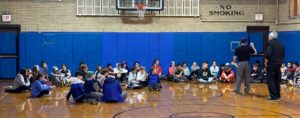
Josh Locks (standing, left) with Paul Thompson (standing, right) train new umpires for WPPA in March 2020 at Green Briar Park Fieldhouse.
Offering youth baseball required hiring umpires. In the early days, WPPA outsourced umpire training to UMPS, where former minor league umpire Dave Slickenmeyer taught the class along with other IHSA umpires. But as WPPA grew, it began directly sourcing and training umpires itself and, in 2005, President Jim Price hired Josh Locks -- a graduate of the Jim Evans Professional Umpire Academy and WPPA alumnus -- to run WPPA's umpire training program.
For many years, including after retiring from the WPPA Board, Paul Thompson managed umpire assignments for the ever-growing schedule of games and expansion into softball. Additionally, former WPPA President Gene Sims began umpiring games himself -- and still serves as an umpire for WPPA as of 2020. Paul handed over umpire assignment responsibilities in the 2019 season to Josh Locks, who continues to train and assign umpires for all WPPA games.
THE HISTORY OF WPPA LOGOS
For a number of years now, our signature logo and the WP script letters are seen frequently all over the Northside of Chicago, but it wasn't always that way. When the league began, coaches wore lighter blue polo shirts with a simple, yellow logo in screen print as depicted here. Those shirts gave way to darker blue shirts (so coaches wouldn't look like umpires who often wear light blue shirts), and a new embroidered logo with crossed bats appeared. But in 2008, the WPPA board adopted a new logo designed by then-WPPA Board Member Erica Gunderson. WPPA modified that logo for the launch of softball in 2014, and adopted the universal version of that logo in 2020 used in connection with the launch of the new website.

From left to right: The orignal WPPA Coach Shirt Logo; the WPPA "Crossed Bats" Logo; the 2008 WPPA Yough Baseabll Logo; the 2014 WPPA Youth Softball Logo.
WPPA GOES ONLINE
Though WPPA had a small, informational, online web presence earlier, in 2011, WPPA decided it was time to move away from the painstakingly manual processes of running the league and launch a new website capable of handling player registration, scheduling, team management and messaging. Under the guidance of President Andy Lowenthal, Vice President Jay Mitchell led the efforts and successfully launched the league's new website on the League Athletics platform for the 2012 season.
No longer would parents have to wake up in the wee hours of a January Saturday morning to line up in the cold around the Welles Park Field House, hoping to secure a spot for their child in the league, and instead could simply complete the entire registration process online. Coaches could blast email their teams important messaging about upcoming practices and games. Rain delays and cancellations were posted to the WPPA homepage so parents could more easily stay current with the ever-changing schedule.
Realizing that the League Athletics platform was not being upgraded to more current, mobile-based website technology, and was slated to be decommissioned within a few years, the decision was made in 2020 to migrate to a new platform with TeamSnap. In addition, and given WPPA had expanded to include softball, the original league URL (wppabseball.com) was replaced with the current URL (wppachicago.org) to better reflect the league's complete offering and not-for-profit organizational status. The new website officially launched in August 2020 for the 2020 Fall Softball season.
WPPA LAUNCHES FALL BALL
In 2013, then-President Jim Coffman and board member Stephen Reynolds invited Lonny Essex to a lunch meeting at John's Place in Roscoe Village to plan the first WPPA Fall Ball season and ask Lonny to join the WPPA Board and serve as the inaugural Fall Ball Commissioner. Because Welles Park's youth football league utilized the fields of Welles Park from August through November, WPPA would have to host it's fall ball season at Winnemac Park. Lonny agreed to join the board and immediately began recruiting coaches and teams, including from other nearby park leagues including Hamlin Park, Oz Park and Warren Park, among others to build community and cooperation among the various independent leagues on the northside of Chicago. In the first year, Fall 2013, WPPA offered 8U, 10U and 12U divisions. Those divisions changed to 9U/11U/13U in 2014, and finally expanded to 8U/10U/12U/14U in 2015 as they are comprised today.
Unlike the highly-formalized, draft-method for selecting teams during the spring/summer house league seasons, Fall Ball was intentionally created more casually. Coaches were permitted to hand-pick their entire roster, allowing a larger group of friends to play together on the same team. To help create competitive play, divisions were subsequently separated at each age level (8U/10U/12U/14U) into "Red" competitive, put-together teams (e.g., spring/summer travel teams staying together as fall ball teams) and "Blue" at-large teams of players who signed up individually (in 2019, the league also added a "Gold" division to accommodate put-together teams of players mostly comprised of house-level players but not travel teams).
Notably, in the first game of the first season in 2013, Fall Ball Commissioner Lonny Essex, acting as an assistant coach for the 12U Dodgers, was thrown out of the game for questioning a call by the umpire (who did not know that Lonny was also the Fall Ball Commissioner). Lonny and the umpire amicable resolved their differences after the game.
WPPA SOFTBALL PREMIERS IN 2014
As the league continued to grow and seek ways to better serve the community, it became inevitable for WPPA to begin offering a separate softball division. In 2013, WPPA took the first step by appointing Ray Owens the inaugural WPPA Softball Commissioner. Ray did yeoman's work building WPPA's Softball offering from scratch and managed to recruit six head coaches and a total of 72 players ages 8-10 to launch the pilot 10U Softball division in Spring 2014:
- Arizona State, Head Coach Matt Rhodes
- Colorado State, Head Coach Dave Keenan
- Kansas, Head Coach Paul Haynes
- North Carolina, Head Coach Al Martinez (Playoff Champion)
- Miami, Head Coach Dave Zalesky
- Tennessee, Head Coach Kristin Reynolds (Regular Season 1st Place)
In 2015, Jill Attkisson took the reins and oversaw the continued expansion of Softball with 11 teams cover two divisions (Major, ages 10 and 11; Minors ages 8 and 9). By 2018, Jill grew softball into the four divisions we offer today -- 8U, 10U, 12U and 14U. Even despite the impact of the COVID-19 quarantine, in 2020 Softball nonetheless continues to host 4 divisions with 25 total teams comprised of 316 players.
AN IMPORTANT PARTNERSHIP THAT SUPPORTS THE COMMUNITY: CHICAGO CUBS CHARITIES
WPPA is made possible, in part, by the support of our generous sponsors. One of the relationships we value most as an organization is Chicago Cubs Charities. The goal of Cubs Charities is to provide increased access to baseball and softball for all Chicago children and they partner with the most effective programs and organizations to achieve positive impact and demonstrated results.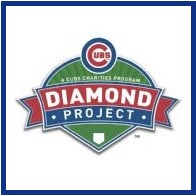
The "Diamond Project" program of Cubs Charities provides grant funding to local baseball organizations and WPPA has benefited greatly from the support of Cubs Charities over the years. The annual contributions from Cubs Charities each year has allowed us to make much needed field improvements, fix backstop fences, and countless other projects that help WPPA deliver the best baseball we can to the local community.
With the emergence of softball in 2014 and in recognition of its exponential growth, in 2016, Cubs Charities acknowledged WPPA's efforts to grow the sport of softball with an increased annual contribution specifically to address the needs of our burgeoning softball program. Our partnership grew deeper in 2018 when Cubs Charities awarded funds to make a major improvement to the Welles Park baseball and softball experience: scoreboards! Scoreboards were installed at the Junior, Minor, Major and Senior Diamonds at Welles Park in memory of Brad Balson (1965-2013), a long-time dedicated coach for WPPA. The scoreboards arrived just in time for the 2018 season and contribute to the excitement of the games at every level.
In recognition of our partnership, the Chicago Cubs also provide the WPPA community each year the opportunity to attend a Cubs home game at Wrigley Field. The partnership with Cubs Charities has been invaluable over the years to WPPA. We are grateful for their continued support and look forward to continuing to build on the great foundation of partnership.
A LEGEND OF WELLES PARK: PAUL THOMPSON
We've mentioned a few people above who contributed substantial time and effort -- many hours over a number of years -- to create, develop, expand and sustain WPPA to the greater community of neighborhoods around Welles Park. But one person truly stands alone -- who has been there every step of the way, who transcends each individual phase of WPPA and embodies what it means to offer best-in-class youth baseball and softball.
Few people alive and around Lincoln Square today were here when Paul Thompson first showed up on a Welles Park ballfield. Some say it was way back in 1992 or 1993, but Paul was there from the first season: see that picture at the top of this page of the 1990 T-Ball Major Mets? Paul's son is on that team.
It didn't take long for Paul to jump in and help in any way he could. Before hiring professional grounds crews, after a typical rainstorm soaked the fields, the first person you would see on the diamonds of Welles Park with his rake, shovel and bags of Turface was Paul, so that games could resume as quickly as possible. He served as a board member for more years than anyone else in WPPA history. He coached. He trained and scheduled umpires -- and called games himself. He took on the thankless, Yeoman's work of creating season schedules for 76 teams by hand -- before the advent of computer scheduling programs. He ran drafts. He ran operations. And he still coaches in the Liberty Division, even though his youngest child aged out in 2002.
Paul also ran the Rules Committee, updated the WPPA Rulebook annually, and was the one guy upon whom you could always count to play within them. For example, coaching in the bottom of the last inning during a Minor championship game, Paul asked his player if he had taken off his helmet before crossing the plate with the tying run. Even though the umpire hadn’t seen it, when the young man admitted that he had removed his helmet, Paul told the umpire to take that run off the board and give his team an out -- the last out of the game.
In 2005, WPPA named the Major diamond in his honor -- a small gesture for a man who gave so much to WPPA over the years, and will continue to give as long as he can.
DEDICATION OF WELLES PARK 4 AS CEANNAICH RYAN FIELD
On June 22, 2024, Welles Park 4, the "Rookie" diamond, was dedicated in the memory of Ceannaich Ryan. As a long-time volunteer coach for more than a dozen teams, he taught players good sportsmanship, a love of the game, and the physical and mental skills necessary to grow and succeed. As a WPPA board member, his vision for the WPPA Rookie baseball program made it more accessible, fun, and focused on development when he reinvented it for the 2023 season. Ceannaich was a staunch supporter of the WPPA house baseball and softball program, and embodied all of the principles that form the basis of the WPPA.
PAST WPPA PRESIDENTS
Gene Sims 1991-1995
Max Griffin 1996-2002
Jim Price 2003-2006
Andy Lowenthal 2007-2010
John Anderson 2011
Jim Coffman 2012-2015
Brian Nach 2016-2019
Ross Kerr 2020-2022
